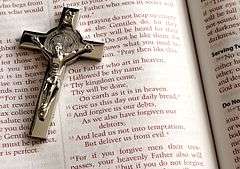Matthew 6:14–15
Matthew 6:14–15 are the fourteenth and fifteenth verses of the sixth chapter of the Gospel of Matthew in the New Testament and is part of the Sermon on the Mount. These verses come just after the Lord's Prayer and explain one of the statements in that prayer.
| Matthew 6:14–15 | |
|---|---|
← 6:13 6:16 → | |
 A crucifix on an open Bible showing Matthew 6 with the Lord's prayer (Matthew 6:9–13). | |
| Book | Gospel of Matthew |
| Christian Bible part | New Testament |
Content
In the King James Version of the Bible the text reads:
- For if ye forgive men their trespasses, your heavenly
- Father will also forgive you: But if ye forgive not men their
- trespasses, neither will your Father forgive your trespasses.
The World English Bible translates the passage as:
- “For if you forgive men their trespasses, your heavenly
- Father will also forgive you. But if you don’t forgive men their
- trespasses, neither will your Father forgive your trespasses.
For a collection of other versions see BibleHub Matthew 6:14-15.
Analysis
The Lord's Prayer is appended by two verses on forgiveness.[1] Allison notes a similar sequence in Mark 11:23-25 and Luke 17:3-6 and proposes a traditional connection between prayer and forgiveness, where prayer is efficacious when members of the community are reconciled to each other.[1]
These verses parallel Matthew 6:12, but while that one speaks of debts this one speaks of trespasses. It states that for a person to earn God's forgiveness they must also be willing to forgive others. Those who do not forgive will not be forgiven by God. It is also similar and becomes clearer in subject matter to the Parable of the Unforgiving Servant found in Matthew (18:21-35).[2] Coogan comments that "reciprocity is vital in the economy of God".[3]
References
- Allison 2007, p. 856.
- France 1994, p. 913.
- Coogan 2007, p. 16 New Testament.
Sources
- Allison, Jr., Dale C. (2007). "57. Matthew". In Barton, John; Muddiman, John (eds.). The Oxford Bible Commentary (first (paperback) ed.). Oxford University Press. pp. 844–886. ISBN 978-0199277186. Retrieved February 6, 2019.
- Coogan, Michael David (2007). Coogan, Michael David; Brettler, Marc Zvi; Newsom, Carol Ann; Perkins, Pheme (eds.). The New Oxford Annotated Bible with the Apocryphal/Deuterocanonical Books: New Revised Standard Version, Issue 48 (Augmented 3rd ed.). Oxford University Press. ISBN 9780195288810.
- France, R. T. (1994). "Matthew". In Carson, D. A.; France, R. T.; Motyer, J. A.; Wenham, G. J. (eds.). New Bible Commentary: 21st Century Edition (4, illustrated, reprint, revised ed.). Inter-Varsity Press. pp. 904–945. ISBN 9780851106489.
Further reading
- Schweizer, Eduard. The Good News According to Matthew. Atlanta: John Knox Press, 1975
| Preceded by Matthew 6:13 |
Gospel of Matthew Chapter 6 |
Succeeded by Matthew 6:16 |